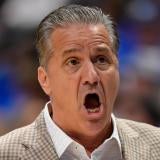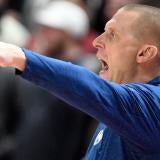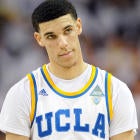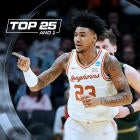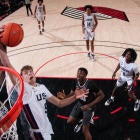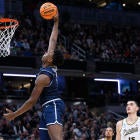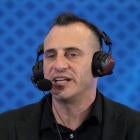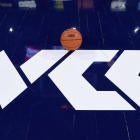Lonzo Ball, college basketball's most entertaining and most unorthodox player, is hard to evaluate because he's equal parts awe-inspiring and befuddling. Nothing he does makes sense on paper, but it works. Still, the question remains: How will his funky but effective game translate to the NBA?
Well, I'm here to tell you that any NBA team that drafts Lonzo Ball in the top five thinking he's going to be a franchise-changing player is in for a rude awakening.
I know. I'm in the minority here. Our NBA Draft expert Howard Megdal has Ball as the No. 2 prospect behind Markelle Fultz. A lot of people agree with him. But I just don't see it. Granted, I've been wrong on this kind of thing before (more on this later), but I'm pretty sure about this one. Just hear me out.
The first time I saw Lonzo Ball and his brothers (LiAngelo and LaMelo) in person was at last year's California high school state title game. I was an editor at MaxPreps.com and I had spent all year covering from afar what was being hailed as the most entertaining high school basketball team in history, so I jumped at the opportunity to see them in person.
Chino Hills, a basketball program that defies all logic and convention by making cherry-picking, full-court passes and 35-foot jump shots essential parts of their game plan, routinely put up over 100 points in 32-minute high school games.
And the engine that drove the high school juggernaut was Lonzo Ball -- a 6-foot-6 point guard who made precise one-handed full-court passes look as easy as swishing 3s from nearly half-court. Lonzo regularly put up triple-doubles, which is unfathomable at the high school level. MaxPreps basketball editor Jason Hickman touted Ball as a game-changing point guard who would one day be a top NBA Draft pick.
But after watching him play, I wasn't convinced.
Lonzo and Chino Hills struggled in the first half against a less athletic, but disciplined De La Salle team (a Northern California power known for its legendary football program), but eventually talent won out -- as it usually does in high school, and Chino Hills won the state title. Of course Lonzo got his numbers (15 points, 10 rebounds, five assists) but his point and assist totals were padded with dunks and alley-oops in the final minutes, when the game was already decided.
Overall I was left thinking, "If Lonzo Ball can be held in check by a disciplined high school team full of average athletes, he'll have no chance playing against bigger, stronger, more athletic players at UCLA."
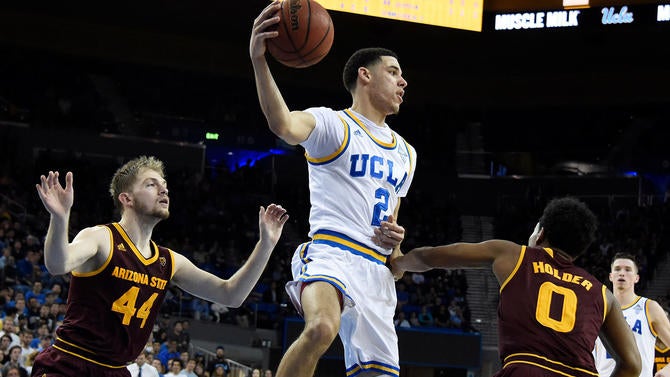
Boy, was I wrong. So incredibly, colossally wrong.
From the opening tip of his college career, Ball has been transcendent. I wasn't convinced he would be able to convert that unorthodox game to the college level, but he has -- and then some. He is averaging nearly 15 points, eight assists and six rebounds per game while resurrecting the storied UCLA program, which has been ranked as high as No. 2 this season.
Meanwhile Ball has been arguably the best player in college basketball. But still, somehow, I'm not buying him as an NBA prospect.
They say the definition of insanity is doing the same thing over and over and expecting different results. Well it's time to lock me up in a padded cell because I'm about to do it again. I'm about to tell you why Lonzo Ball's game will not translate to the NBA -- why scouts and talent evaluators are fooling themselves if they think Ball will be a franchise-changing guard, no matter what Ball's outspoken father says.
As I mentioned earlier, I've done this sort of thing before, trying to quell the fervor surrounding a talented but enigmatic UCLA guard, and last time it didn't go well at all. Yes, my name will forever be attached to an article titled, "Don't draft Russell Westbrook," because my friends and I beat his team in a pickup game at UCLA and I felt the need to tell everyone about how bad Westbrook played. I'm not proud of it -- I was young, still buzzing off probably the biggest athletic achievement of my life -- but I've learned from my mistakes.
This time is different. This time, I have statistics on my side. This time, I'm basing my conclusions on facts and a strong sample size of data -- rather than a Saturday afternoon pickup game.
Before we get started let's get a couple of things straight:
- I am not in the business of publicly shaming teenagers. The only reason I'm writing this is because on multiple occasions I have heard the phrase, "potential No. 1 overall NBA Draft pick" in front of Lonzo Ball's name. I can't sit idly by and let this talk continue.
- I believe with all my heart that Lonzo Ball will have a long and successful NBA career. I just don't think he is the franchise-changing player that everyone seems to think he is.
Please keep these two things in mind as we take a look at why Lonzo Ball's shortcomings will keep him from becoming a superstar NBA point guard.
But first, we can't start without taking a look at Ball's irrefutable strengths:
Passing/court vision
Absolutely off the charts. Before a defensive rebound or outlet pass is halfway into his hands, Ball is already looking down court to find the first open man. This is the way he played in high school, and the way he will continue to play. If you're open, particularly in transition, Ball will find you. Sure, some of his passes won't work against NBA defenses, but he'll learn and adapt. Those passing instincts will always find a way to shine through.

Confidence
When I saw Ball in the state championship last year his demeanor and body language, like it does to many others who watch him play, rubbed me the wrong way. He seemed "over it" and showed no remorse while airballing 35-footers and repeatedly turning the ball over. As I watched him lead his team to a torrid second-half comeback, something occurred to me -- the swagger and confidence are essential to his success.
In order to shoot the shots he does and make the passes he does, he has to believe, without a shred of doubt, that it's going to work. That's why he plays with a confidence bordering arrogance -- because he has to. That's not going to disappear when he reaches the NBA. He's still going to believe he's the best player in the gym even when he's far from it, but that belief is essential for him to play and succeed in the style that he does.
3-point shooting
People point to Ball's shooting mechanics, which are ... unorthodox, to put it lightly. Basically Ball's mechanics make Joakim Noah look like Klay Thompson. As much of a problem as this might seem, I'm actually not worried. Ball can make shots -- he always has and he always will. My colleague Matt Norlander did an excellent job breaking down Ball's shot and why it doesn't need to be changed, so I'm not alone here.
Plenty of NBA players have been able to consistently knock down shots with broken-looking mechanics (the now-retired Kevin Martin and his funky form come to mind). Ball is shooting 54 percent from the field and 43 percent on 3-pointers, an effective field goal percentage of .664 -- good for seventh in the NCAA, but all the players ahead of him are forwards and centers with far fewer 3-point attempts. And you can't really make the argument that he won't be able to transition to the deeper NBA line since he already takes many of his 3s from that distance, dating all the way back to high school.
It might be ugly, but there's no doubt that it works.

I hear you, I hear you: "So you wrote an article about why Lonzo Ball sucks and then all you do is talk about how good he is?" Fair enough, let's get down to business.
There are three key reasons why I believe Ball won't be the transcendent player that he is expected to be in the NBA. These three things are deal-breakers when it comes to being a superstar point guard in the NBA, and they are the things that will ultimately hold him back.
He doesn't (can't?) shoot 2-point jump shots
This is huge. Guess how many 2-point jump shots Lonzo Ball has made this season. That means a shot that isn't a 3-pointer, layup or dunk. Go ahead, think about it ... we have time. Alright, that's enough, you'll never get it.
Two.
According to Hoop-Math.com, Ball has made just two shots in 22 games so far this season that weren't 3s or dunks. And he has only attempted 11 of them. Eleven!
While you pick your jaw up off the floor, let's examine what that means. Some might tout the stat as a sign that Ball is ready for the modern NBA, a paragon of the Daryl Morey/Stephen Curry nature of a league where 3s reign supreme and we scoff at low-percentage 2-point jump shots.
That all makes sense except for one thing -- NBA point guards still take, and make, a lot of 2-point shots. Here's a list of point guards in the NBA that attempt three or more mid-range shots per game (outside the paint and inside the 3-point line): Russell Westbrook, John Wall, Kyrie Irving, Chris Paul, Derrick Rose, Eric Bledsoe, Damian Lillard, Kemba Walker ... the list goes on.
Even 3-happy Steph Curry attempts more than 2.5 mid-range shots per game. This would be a good time to remind you that Lonzo Ball has only attempted 11 mid-range jumpers ALL SEASON. That's one every two games.
So what? Who cares if he doesn't shoot long 2s?
Well, think about this: Pick-and-rolls account for a larger percentage of NBA offense every year. The purpose of the pick-and-roll (or pick-and-pop) is to force the defense to make decisions and rotate. When a point guard comes off the screen he has three choices -- pass, drive or shoot.
If Lonzo Ball refuses to shoot off a pick-and-roll unless he's behind the 3-point line, that means the defense can be slower with its rotations, or just send the guard over the screen and have the big man drop since they know Ball is not going to take, or make, a pull-up mid-range shot. That's exactly what happens to Kyrie Irving in this clip (the guard goes over the screen to take away the 3 and the big man drops into the paint), but Irving is an adept mid-range shooter and makes the easy pull-up.

Players like Irving, Westbrook, Paul and Walker thrive off of these pull-up jumpers coming off the screen. It's hard to believe Ball will join the NBA's elite point guards unless he learns to shoot 2-point jumpers effectively, which probably won't happen any time soon since it's something he has never consistently done.
He's afraid of contact
Ball has a slight frame and will put on weight, but his ability to finish through contact needs to vastly improve. Ball lacks elite NBA athleticism, but is very tricky around the basket -- he's able to use both hands to elude defenders and finish layups. Those plays are generally in transition when he can get separation from the defender.
When Ball runs into a physical defender, he doesn't finish the same way. He's shooting 76 percent on shots at the rim, which is good, but that's because he usually doesn't even try to finish when there are defenders in his way, electing to pass the ball out to the perimeter. That's fine for now, but shying away from contact isn't something that's going to fly at the NBA level.
Westbrook, Walker and Isaiah Thomas all rank in the top 10 in the NBA in field goals made with their defender at the closest range (0-2 feet). That means they're taking, and making, a lot of contested shots each game. And that doesn't even count the shots where they get fouled -- Westbrook, Thomas and Lillard are all in the top 10 in free-throw attempts per game.
Ball has only averaged three free throws at UCLA. As often as he has the ball in his hands, the lack of free throws is a sure sign that he doesn't exactly welcome contact in the paint (he's also only shooting 66 percent from the stripe, which is another issue). Getting into the teeth of the defense and being able to finish or get fouled is essential for an NBA point guard, and it's something that Ball doesn't seem to be capable of at this point.
Again I go back to the pick-and-roll. If Ball comes off a screen and the defense knows he won't shoot a mid-range pull-up or drive hard to the basket, the defense can guard solely against Ball's two biggest strengths: pull-up 3s and passing. That will make life much more difficult. Take this example, where the big man switches onto Ball, taking away a deep 3-pointer. Rather than putting his body into the defender and driving toward the rim to force the action, Ball is content to back off and pass to the corner.

You would like to see Ball welcome contact and get to the free throw line much more at this stage of his career. The physicality of the NBA game is going to eat him for lunch unless he improves -- quickly.
Defense
This last one is harder to quantify, but let's just call it what it is: Ball is a terrible one-on-one defender. UCLA has done a great job hiding him with zones and by switching nearly everything when in man-to-man, but when Ball gets isolated against a scoring guard, it's not pretty.
In the Bruins' game against Arizona, for example, when Ball found himself occasionally matched up against stronger guards like Kadeem Allen and Rawle Alkins, or quicker guards like Kobi Simmons, he was quickly exposed. In this clip, Simmons blows by a flat-footed Ball, leaving him with no choice but to take a desperation swipe at the ball, which drew a foul.

Does a lack of defensive skill stop a guard from thriving in the NBA? Absolutely not. But as we know, when NBA coaches smell blood with a mismatch, they exploit it over and over and over. Until Ball becomes stronger, improves his lateral quickness, and makes a commitment to defense, he's going to have a hard time finding playing time if his shot isn't falling.
Conclusion
Again let me reiterate -- I think Ball will have a fine NBA career. But he needs to change a lot about his game if he wants to be a superstar. As we've seen in the past, hard work can trump most shortcomings. If Ball is relentless about working on his faults and is willing to adapt his game, he may be able to find a new level in the NBA.
But is that a risk you want to take with a top-five pick?
In a class loaded with point guard talent like Markelle Fultz, Dennis Smith Jr. and D'Aaron Fox, along with polished wing players like Jayson Tatum and Josh Jackson, it just doesn't make sense to take Lonzo Ball if you're looking for a franchise player.








